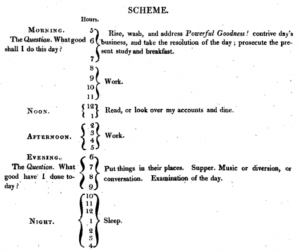A few years ago I visited the Huntington Library in Los Angeles. We spent most of our time poking around the beautiful gardens, enjoying the Californian sun. But the Library collection is pretty remarkable too and it holds copies of the Gutenberg bible, Audubon’s bird drawings, early Shakespeare editions and – a definite highlight – Benjamin Franklin’s autobiography.
I’m not sure why I suddenly remembered this now, almost four years later, but when he wasn’t experimenting with electricity and founding countries, Franklin was also a bit of a productivity guru. Check out this extract from Chapter 8 of his autobiography (click for bigger):

He was pretty keen on everything having its own allocated time, supporting what he called the virtue of Order. He never seemed to be quite satisfied with the progress he made (bit hard on himself really) but the interesting thing, I think, is that you can see him actively reflecting on his progress and acknowledging its benefit. Check out these extracts:
I enter’d upon the Execution of this Plan for Self Examination, and continu’d it with occasional Intermissions for some time. I was surpris’d to find myself so much fuller of Faults than I had imagined, but I had the Satisfaction of seeing them diminish.
And later:
In truth, I found myself incorrigible with respect to Order; and now I am grown old, and my memory bad, I feel very sensibly the want of it. But, on the whole, tho’ I never arrived at the perfection I had been so ambitious of obtaining, but fell far short of it, yet I was, by the endeavour, a better and a happier man than I otherwise should have been if I had not attempted it
So there you go: Benjamin Franklin, the grandfather of personal productivity c. 1791. As if he hadn’t done enough already!
 “Incrementing productivity” is oftentimes framed in terms of incentives. The simpler incentives are, of course, monetary incentives. Academia is in this respect not so different from the business world – or so think many university managers and administrators. Some well endowed universities pay a premium to productive researchers: for instance, €3,000 for an article in an A+ journal, or maybe a lighter teaching load. The intrinsic value of discovery, and the thrills of fame, are no longer or not only the principal movers for scientific production. Not everyone agrees.
“Incrementing productivity” is oftentimes framed in terms of incentives. The simpler incentives are, of course, monetary incentives. Academia is in this respect not so different from the business world – or so think many university managers and administrators. Some well endowed universities pay a premium to productive researchers: for instance, €3,000 for an article in an A+ journal, or maybe a lighter teaching load. The intrinsic value of discovery, and the thrills of fame, are no longer or not only the principal movers for scientific production. Not everyone agrees.